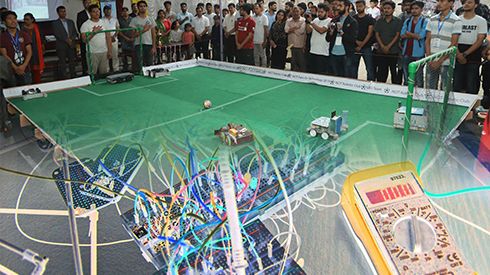
Bachelor of Electronics and Communication Engineering (BE Electronics & Communication) focuses on Electronics and Communication Technology alongside electronic hardware and communications systems. The programme cover a wide range of application areas having a direct effect on daily life. The programme enables students to solve problems confidently through their knowledge and skills. This helps to develop highly qualified Electronic & Communication Engineers. Development in Electronics, audio & video communication systems. Automation in industries and various sectors has made an Electronic Engineer a catalyst for the change of modern society.
Key Learning Outcomes
• Gain knowledge of analog & digital hardware to design, install, establish and monitor communication systems
• Specialize in guided or unguided networking technologies to manage the existing systems and optimize their use
• Enable conceptualizing, designing, and developing electronic products, systems, services, & processes to improve functionality and reliability
• Acquire hardware essentials of robotics & automation and power electronics to support industrial plants, medical facilities, security operations or the defense industry
• Resolve system-related issues and problems relating to electronic devices & communications to ensure smooth operation
Career Prospects
Ever-increasing job prospects! BE Electronics and Communication Engineers have many opportunities to work in the diversified, highly competitive and fast-changing fields of electronics and communication engineering in Nepal or elsewhere.
These engineers get suitable jobs such as Telecom Engineers, Network Administrators, Robot Designers, or Technical Support Representatives.
Careers by area
Telecommunication – Telecom Engineers in mobile & telecom companies or vendors
Network Administration – Network Administrators in various organizations
Robotics – Robot Designers in companies and military or security services
Embedded Systems – Experts in companies that design, develop and maintain consumer electronic devices and communication systems
Biomedical Instrumentation – Electronics Engineers to monitor biomedical instruments for health-care institutions or hospitals
Telemedicine – Electronic Engineers for facilitating electronic processes for online medical consultation
VLSI – Electronics engineers in semiconductor, IC fabrication, and chip design companies
Research – Research workers in key areas like satellite communication, mobile and wireless communication, sensor networks, digital and analog signal processing, semiconductor technology, robotics, and nanotechnology
